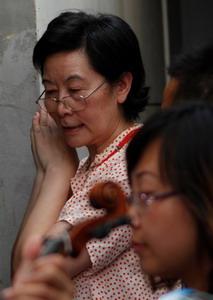Profiles
Educating migrant children
By Cheng Yingqi (China Daily)
Updated: 2010-07-09 09:26
 |
Large Medium Small |
BEIJING - "Riding the wind, I set my sail; Ploughing the waves, I cross my sea."
Quite similarly, 137 students of the school also drifted away "like dandelion seeds" after they sang the last chorus - We are a family - on their graduation ceremony on Tuesday.
Some would return home with their parents, some would go to a cooperative technical school to continue their studies, while others would join their parents to become migrant workers.
|
|
Such a future, undesirable as it may be, is something these children couldn't have imagined had there not been the Dandelion Junior High School.
The first of its kind dedicated to providing high school education for the once largely neglected children of migrant workers, the school, which was established in 2005, is the brainchild of 55-year-old Zheng Hong.
China's first woman to earn a doctorate degree in geology, Zheng had never thought of becoming a middle school principal, let alone founding a school dedicated to the children of migrant workers.
In fact, before she went to study at Harvard University for a master's in public administration in 2001, she had heard little of non-governmental organizations (NGOs).
She, however, took to the concept the moment she came to understand the role NGOs could play to help address problems ignored by the government.
Zheng set out in search of projects to start after she returned from the United States.
After several discussions with friends, Zheng came to realize the lack of educational opportunities for migrant workers and their children in the city.
At that time, there were an estimated 6 million migrant workers in Beijing, which was busy gearing up to host the 2008 Olympics.
But their kids had nowhere to go after they completed primary school, as the national capital did not have any private secondary schools for children of migrant workers.
While the access to public schools was mostly restricted to Beijing natives, they had to part ways from their parents to continue their studies or drop out.
Zheng conducted a research and presented the results to some like-minded friends.
Hence, the Dandelion Junior High School was born.
"The school has never been my personal effort, not even its beginning," Zheng says. "It's a collective effort."
The school wouldn't have opened, survived and thrived over the years without the support of more than 30 friends, mostly career women serving high positions in major companies or the government, Zheng says.
Thanks to their constant support to help raise funds, the school has developed from around 200 students in its first year to more than 600 at present.
Located in a village in Beijing's southern suburb of Daxing district, the school is built inside a deserted workshop. Most of the classrooms are made of iron plates.
Even teachers live in shabby dormitories and eat vegetables donated by villagers. Their salaries are 1,800 yuan a month, less than half of what their counterparts make in public schools.
What the school lacks in facilities, the teaching staff makes up in compassion.
"Out of every three teachers I recruit, two quit because the pay is too low," Zheng says. "But those who have stayed have stayed for the students."
Zheng remembers a Duke University student who came to the school last September to volunteer as an English teacher.
"She said the students taught her more than she could ever teach them," Zheng recalls. "She was particularly impressed by their optimism even though their living conditions were far from desirable."
Zheng, too, has stuck around for somewhat the same reason.
"People tend to look down upon the children of migrant workers because they are poor," she says. "But in my eyes, they are just like dandelions. They have to drift with their moving parents, but they can thrive anywhere once they take root."
Over the past few years, as both the government and the society have come to realize the importance of equal education for children of migrant workers, a number of similar schools have opened up not only in Beijing but also in other cities like Shanghai and Guangzhou.
At the same time, many cities have opened their public schools to the migrant kids.
Beijing issued a new regulation to give children of migrant workers equal access to public secondary schools this May.
While Zheng says she is happy to see the increasing access for the migrant children, she warns of one essential element for equal education.
"We shall respect the children regardless of their family backgrounds," Zheng says, "because they are dying to learn more, they are always ready to help others, they are creative and they usually look at the good side of things."




